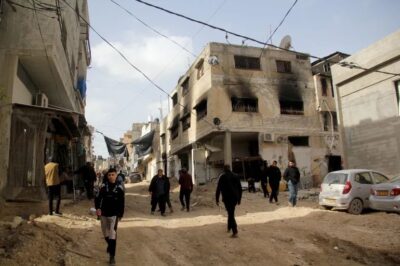In an intensifying Israeli military campaign, now in its 22nd consecutive day, bulldozers continue to demolish homes in the Nur Shams refugee camp, located east of Tulkarem, in the occupied West Bank’s northwestern part.
The demolitions are in line with an Israeli directive to remove 11 homes, ostensibly to build a road from the refugee camp’s main square to the Al-Manshiyya neighborhood. Several Palestinian families residing in these homes are affected.
The demolitions commenced on Saturday, targeting multiple residential structures around Abu Bakr al-Siddiq mosque, situated in the camp’s central square.
Nihad Al-Shawish, who leads the Popular Committee for Services in Nur Shams refugee camp, stated that the Israeli occupation is intensifying its stranglehold on the camp, leading to unprecedented aggression and large-scale forced displacement.
Al-Shawish noted that Israeli forces are using live ammunition to intimidate residents into abandoning their homes while systematically demolishing properties, streets, and infrastructure.
According to Al-Shawish, for the second consecutive day, Israeli bulldozers continue to execute the plan to destroy 11 residential buildings housing numerous families.
The destruction extends beyond the targeted structures due to their proximity, resulting in widespread damage to other homes and buildings.
The exact number of homes fully or partially demolished remains unknown due to the ongoing assault and siege.
Al-Shawish further added that the occupation forces have not only conducted widespread demolitions but have also deliberately set homes and establishments on fire, exacerbating the devastation.
The refugee camp’s infrastructure, including electricity, water, sewage, and communication networks, has been utterly ravaged, leaving it in a catastrophic state.
The relentless Israeli assault has also caused mass displacement; since the beginning of the aggression, approximately 9,000 of the camp’s 13,500 residents have been forcibly displaced under military threats and at gunpoint.
Entire neighborhoods and the central area of the camp have been vacated, with families seeking refuge in shelters or with relatives in nearby villages and towns.
Al-Shawish highlighted that the remaining residents face dire conditions due to severe shortages of essential supplies, including food, water, medicine, and infant formulas. The ongoing siege has completely restricted movement in and out of the camp, with Israeli forces indiscriminately firing at anything that moves.

